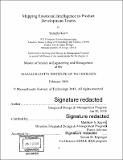| dc.contributor.advisor | Matthew S. Kressy. | en_US |
| dc.contributor.author | Karri, Suneeta | en_US |
| dc.contributor.other | Massachusetts Institute of Technology. Integrated Design and Management Program. | en_US |
| dc.date.accessioned | 2018-10-15T20:24:37Z | |
| dc.date.available | 2018-10-15T20:24:37Z | |
| dc.date.copyright | 2018 | en_US |
| dc.date.issued | 2018 | en_US |
| dc.identifier.uri | http://hdl.handle.net/1721.1/118545 | |
| dc.description | Thesis: S.M. in Engineering and Management, Massachusetts Institute of Technology, System Design and Management Program, 2018. | en_US |
| dc.description | Cataloged from PDF version of thesis. | en_US |
| dc.description | Includes bibliographical references (pages 71-72). | en_US |
| dc.description.abstract | There is no doubt that performance and output of a product development teams can be attributed to creativity, knowledge and leadership. To increase the chances for a successful project outcome, open communications, trust, and judgment should be shared between PMs and their stakeholders (Skulmoski & Hartman, 2010). However, there are several claims about the positive effect of emotional intelligence (EI) on work team performance, both in commercial and scientific literature. Emotional intelligence (EI) plays a role in effecting that trust. Goleman, Boyatzis, and McKee (2002, p. 59) suggest that by cultivating trust El can help one maximize "cooperation, collaboration, and effectiveness." This thesis focuses on Integrated Design and Management program, where engineers, designers and business professionals come together to form teams and develop innovative products. These teams start with same project brief and with a similar goal in mind. In this study, I am assessing emotional intelligence using the mood meter from the RULER course by Yale Center for Emotional Intelligence. Other parameters are collected through observation, surveys and interviews at different stages of the project with individuals enrolled in the IDM program at MIT. This thesis will be mapping individuals' emotional intelligence with their disciplines, roles in the project and at different phases of the project. Teams can lead to positive inferences relating to multidisciplinary teams and competitive work cultures. I believe that studying the correlation between the different parameters can lead to useful inferences relating to team performance and work satisfaction of individuals. | en_US |
| dc.description.statementofresponsibility | by Suneeta Karri. | en_US |
| dc.format.extent | 72 pages | en_US |
| dc.language.iso | eng | en_US |
| dc.publisher | Massachusetts Institute of Technology | en_US |
| dc.rights | MIT theses are protected by copyright. They may be viewed, downloaded, or printed from this source but further reproduction or distribution in any format is prohibited without written permission. | en_US |
| dc.rights.uri | http://dspace.mit.edu/handle/1721.1/7582 | en_US |
| dc.subject | Engineering and Management Program. | en_US |
| dc.subject | Integrated Design and Management Program. | en_US |
| dc.title | Mapping emotional intelligence in product development teams | en_US |
| dc.type | Thesis | en_US |
| dc.description.degree | S.M. in Engineering and Management | en_US |
| dc.contributor.department | Massachusetts Institute of Technology. Engineering and Management Program | en_US |
| dc.contributor.department | Massachusetts Institute of Technology. Integrated Design and Management Program. | en_US |
| dc.identifier.oclc | 1055162057 | en_US |
